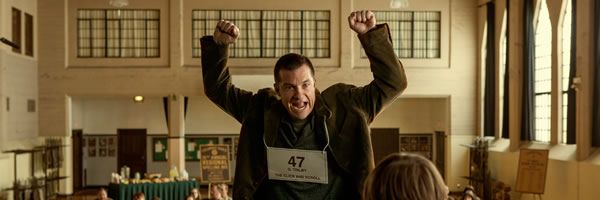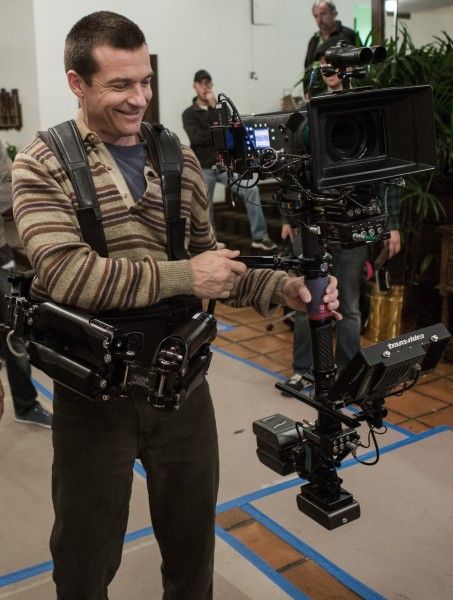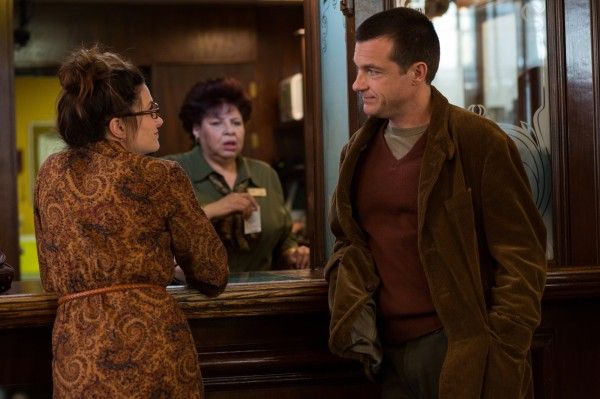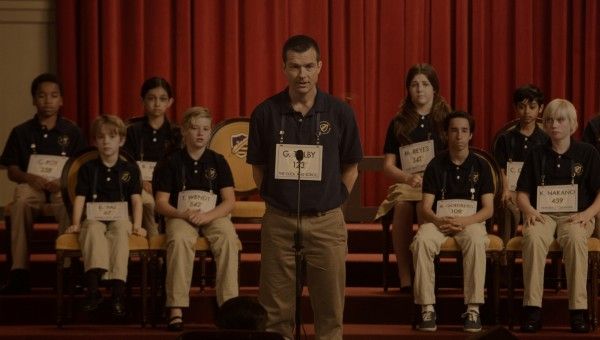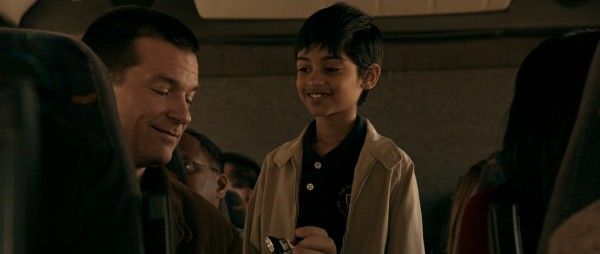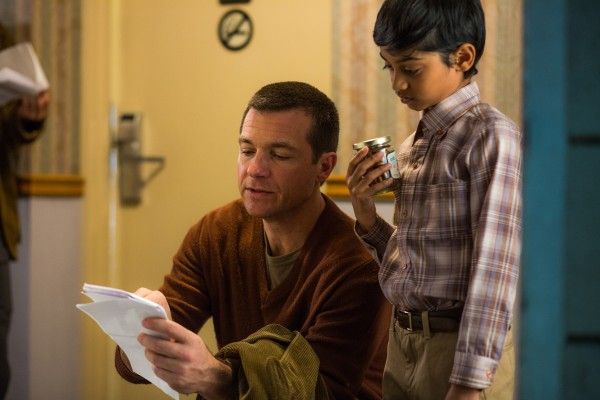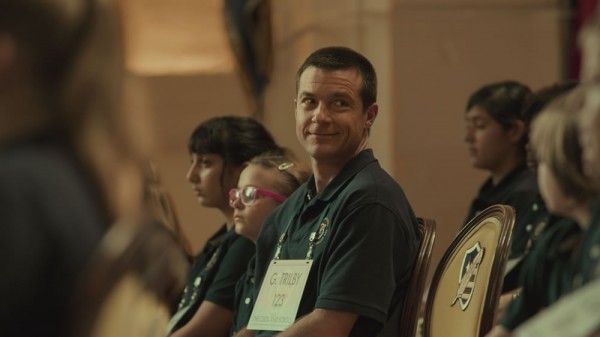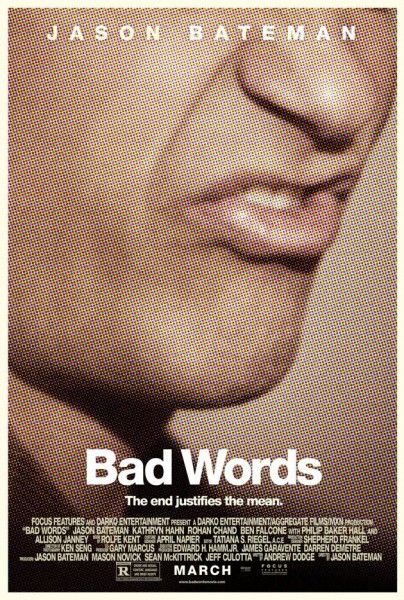One of my favorite films at last year’s Toronto International Film Festival was Jason Bateman‘s directorial debut Bad Words. Andrew Dodge’s awesome script centers on a high-school drop-out (Bateman) who uses a loophole to compete in an 8th grade spelling bee, enraging teachers and parents alike, but befriending an awkward young contestant along the way. And while the film could easily be a family friendly, PG movie that plays it safe, I’m happy to report Bateman has crafted a wholly R-rated movie that’s loaded with inappropriate dialogue and hysterical situations. It also explains why Focus Features snapped it up during an all night bidding war following the world premiere. Bad Words also stars Kathryn Hahn, Allison Janney, Ben Falcone, Philip Baker Hall and Rohan Chandz and opens in select theaters March 14th and expands across the country on March 21st and March 28th
Last year, when the production was filming in Los Angeles, I got to visit the set with a few other reporters. During a break in filming, we landed a great interview with Jason Bateman. He talked about why it took so long to direct his first feature, why he wanted to make Bad Words, his character, how it was always going to be rated R, why he shot with digital cameras, and a lot more. Hit the jump for what he had to say.
Question: So this is your first directorial feature despite being in the DGA at the age of 18, what took you so long?
Jason Bateman: Well, they don’t hand out a lot of movies to direct so there’s that. I did a good bit of episodic television directing, but directing a movie is so much more complicated. And there’s so much more responsibility because the medium is very much a director’s medium. Television is much more of a producer’s writer’s medium so a lot of the time when you’re directing a television show they have a color palette on set or a visual style and dynamic that’s already been predetermined and you just kind of have to follow the rules. So it’s a different job, so truthfully, if I had done this any earlier I wouldn’t have had much fun as I’m having now. I’m sure when I direct a film ten years from now, I’ll be having even more fun than I’m having now. I’m surrounded by talented craftsmen, technicians; people who are super skilled at their job and if you know a little bit of what you’re doing you can take full advantage of what they have to offer. You can have one dept. compliment another dept. It’s like you’re conducting an orchestra where you’ve got all these different instruments and you decide at what level those instruments are going to play because you’re going to play this one higher or lower and you don’t even know how to play those instruments but you know combined together you will make a proper sound.
Why Bad Words?
Bateman: The short boring answer is that I thought it was really funny and had a comedic tone I kind of understand. Things that make me laugh were in this script so I thought it would be a good fit. It seemed like something that I could handle because I didn’t want to take a too bigger swing. I didn’t want to be too obnoxious either with what I was asking for. I didn’t want to go marching into a studio and ask them for 30 million dollars to direct a movie with a bunch of effects. This is a small black comedy for under 10.
Acting in the film?
Bateman: I originally didn’t want to act in it because I wanted to be able to just focus on the directing and I thought it would be a good part to attract a good actor that would be appealing to the financier. Then ultimately, I thought well, I might be making my job easier if I don’t have to direct the lead actor. There’s a kind of a trick tone with this movie because the character I’m playing is so sort of prickly and acerbic and if that guy’s not likeable than you’re kind of lost. So I hope that I’m playing him in a way that’s likeable but also prickly. I’m sort of just betting on myself as opposed to running the risk of having to try and find that tone with another actor. We have a short schedule because we don’t have a lot of money, so I thought maybe I’ll be hitting the ground running with a performance in the world that I would want as opposed to doing some creative negotiations with the first five takes of every single scene with an actor that might hear it differently than I hear it. So that was kind of what went through my mind.
Allison and Ben said yes to the project without reading the script, can you talk about casting and the reasons behind your choices?
Bateman: Each of those people is perfect for their parts and they were friends of mine. And I knew that they would appreciate the part too. That they wouldn’t just be doing me a favor. They would see that those parts were fun parts to play and they would be eager and they would be helpful, and they would plus the process as opposed to giving me just a few hours of their day. I need help from everybody because I’m a first timer.
You’ve kind of made a career out of making some prickly characters likable...
Bateman: Oh good.
You’re constantly scheming as an actor, why do you gravitate to roles like that?
Bateman: I was a big Archie Bunker fan growing up and on paper that guy said some really nasty things. Even Louie de Palma, but there was something about the way that they played it in their eyes and in their body language that made it okay. That they were coming from a place of ignorance instead of anger or intolerance. That’s an interesting kind of combination to play. Because inherent in that is the character’s vulnerability. If they’re not that smart or if they’re insecure, or vulnerable and because of that they are acting out and being sort of prickly. To me that’s kind of interesting. For me one of the keys to make an audience laugh is if you’re showing some flaws and your pants are down. There’s nothing funny about a guy who’s got it all together. I like that angle of making people laugh. Sort of acting like you’re more confident than you actually are.
Did you see this on the page?
Bateman: In this character, yes. If it’s not on the page in some things, there’s usually a place to play it even though it’s not written. There are a couple of scenes you can identify where you can say: “Okay, I can maybe play it a little more nervous instead of bitter.”
Did you co-write the script?
Bateman: No, Andrew Dodge wrote it and he was nice enough to let me get in there and do some work on it and take it in the direction that I heard as the funniest; with my sense of humor. Lucky for me, he kind of agreed and it is what it is now.
How’s your spelling?
Bateman: It’s pretty good. Although I’ve been missing some very, very short words. It’s hard because I’m imagining what the shot is and at the same time trying to remember the letters. But for the most part, it’s been the greatest experience of my life. It’s the greatest job in the world, directing a movie. I could not be more envious of the guys who get to do it all the time. This is a treat to be able to do it.
I’m curious, you have a number of friends who work in town, how do you feel about having famous friends cameos?
Bateman: It depends on what the profile of the movie is. If you’re trying to go for something, which is a little bit real, in its tone, than cameos can bump you out of it. But if it’s something a little bit more glossier, a little bit more commercial, a little bit more studio, a little bit more broader than I think those cameos are on tone and they’re really fun.
Cameos in this?
Bateman: In this one, yeah, I think it would kind of bump you out of it. Hopefully if we’ve done our job right and I won’t know until we’re done, but hopefully what I’m going for is something that’s got a little dirt under it’s nails and cameos I think would bump you out of it.
Talk about Guy Trilby, he’s a loner right?
Bateman: Yeah, he’s just recently found something out that has really upset him and he’s trying to right a wrong and doing it in a very aggressive, petulant way. If he were any more emotionally advanced he wouldn’t do what he is doing. We wouldn’t have a movie, so he’s kind of acting out. And by the time he gets a good head on his shoulders, the movie is over and he makes an apology. This is a Spelling Bee which is the second best Spelling Bee in the country. So the kids here, the judges here, the parents here, it’s all kind of a little dank. People in this world are sort of in the fringes of society that we live in. They are the people that you drive by but you never really talk to. They are kind of all around us. And as a result of that they are capable of doing things that we wouldn’t necessarily do, my character being one of them. They can justify behaving in a way that they’re not super consistent with what society is used to.
Rating?
Bateman: It’s written as an R and we’re not doing any takes to get a PG 13.
You have a very dry sense of humor – where does it come from?
Bateman: My mother is British, she’s from Shrewsbury. She turned me onto Monty Python very early.
When did you start preparing for this film? How did you prepare that you could hit the ground running on day one?
Bateman: Andrew and I started working on the script a couple of years ago. And it was a matter of finding the right time to schedule this as there is time spent in pre-production versus principal photography and then of course, post production. And we were just trying to find the right time between my day job where it would make good sense to effectively step away for nine months. Even though I’m in this, I’m getting so many nice opportunities in commercial studio work that wouldn’t have been smart to do it at any other time. In town at the end of the year (Dec 2012) it kind of fits nicely. We started pre-production three months ago and we’ve been shooting for a month now. It’s amazing, I’ve never been to exposed to pre-production and so it was pretty amazing to watch all the hard work that goes into prepping and who important it is that when you show up on the set, everything is ready to go. When you’re actor, you have no idea how much work goes into pre-production. We’re just sitting in our trailer waiting for someone to knock on our door to go to the set. But really the movie has been made already, all the shots have been decided on. Sets have been built and dressed; locations been scouted; lighting has been set. Everything has been made ready for the actors to come in and talk and then they go away. And more of the movie is made. We really work for ten minutes an hour while the movie is really being made in the other 50 minutes. I just feel so fortunate to be in this position right now. My work ethic at this point in my life is really strong whereas when I was a little punk, the last thing I wanted to do was read a script or go to work. But now I appreciate where I’m at and to point all of those energies, it’s so satisfying.
What’s happening with Arrested Development the movie?
Bateman: Well the series that will be coming out on Netflix (released last April) will be tee’ing up the movie. They basically lay the foundation for all the questions that movie answers, plus they catch everybody up on where the characters have been for five, or six years and give knowledge to those who’ve never seen the show as to who these characters are. So that will be really exciting. As of now a deal has not yet been made so who knows if we’ll see a movie. If we don’t the episodes will be fully self-contained and satisfying within themselves.
A lot of actors don’t feel comfortable watching the dailies, but as a director you have to do that. How comfortable do you feel watching yourself?
Bateman: It’s a dream. It feels like home. My wallpaper is full of pictures of me… No, I’ve always learned a lot about what I need to be better by watching myself because you can feel like you’re communicating x level of anger or happiness or nervousness and then you can watch it on film and it’s just not as good. Or big or small as you intended. You also learn lens sizes and what lighting can do; what the composition is and where you fit in the frame. So it’s been really educational for me over the years, I’m always amazed at how actors don’t look at themselves and how there’s a shyness about that because it’s antithetical to what they’re doing. They’re doing something for the public, yet they can’t stand to watch themselves… I don’t know. And nine times out of ten, those actors are fantastic! And they don’t treat themselves to watching how good they are.
Did your experience as an 18 year old directing light this fire to become a director now?
Bateman: The thing I was really excited doing then was working with the crew, basically your friends and family who you’re with everyday. I was doing a television series so it was nice to have a different job with them. I still feel that same thing. I’ve always admired and respected what people behind the camera do. They really make the movie but they just don’t get any attention for it. It’s just a total injustice. So it’s just a pleasure to be able to work with them in a meaningful capacity above and beyond acting. But really what’s fueled this is just like anybody in any job. The longer you stay in the job that you do the more you learn about what those around you do. As an actor I’ve always nosed around apologetically about: “oh wouldn’t it be interesting if I could do that?” I can’t imagine not wanting to do this everyday.
Film or digital and why?
Bateman: I’m not smart enough to break down the actual cost effectiveness or efficiencies between the two, they are pretty close. I know that certain processes are easier with digital and in postproduction. With this film, because I’m working with so many kids, I knew I wanted to keep the camera rolling for a long time, and not cut so it made more sense to go with digital. Film can be very expensive and you don’t get the luxury of time that you get with digital. On top of all that, what digital is looking like these days is just incredible. The films I’m loving the looks of a lot of them are shot digitally now. If it’s good enough for Fincher… we have the palette that we wanted on this film.
Was finding the tone the biggest challenge for you as you’ve only directed for TV before?
Bateman: I don’t know if challenge would be the right word, it was the thing I was most excited about. I just didn’t know if I would be as good as I thought I might be at articulating at what I was seeing in my head. The relevance of blues versus ambers; long lens versus wide lens; or dolly track versus steadycam versus handheld and all of these things help guide an audience’s emotion and set the table for them to have some sort of pay off in the next scene. Working with all those elements is an incredibly complicated challenge that I’m excited to work with a hundred people to figure out. And try to find a common language where you can find that specificity using the same sentence. That tone thing is really important. I wanted to film a demanded specific tone, not just something where you throw on all the lights, have funny jokes and shoot everything wide, and crank up the music and it becomes kind of junk food. It goes down real good but it leaves you a little empty. Hopefully this is something that’s got a little something under it, I mean not much, I’m not trying to make anyone smart by watching this movie.
When you’re traveling outside of LA, what do fans remember you for?
Bateman: Well the people who like Arrested Development are very eager to come up and say something because that specific audience are the kinds of people who would come up and say something. I’m very fortunate for that. Anytime I do get stopped no matter what project is for… if you’re a ‘celebrity’ then when people recognize you they may kind of scene. It’s like: “Look that animal got out of the zoo!” And people make a big to do about it. I’m not a ‘celebrity’. I’m not a big huge star and so when people see me it’s usually to talk about something I’ve done and that’s a great conversation to have. That’s what we’re doing it for.
Click here for all our Bad Words coverage.

